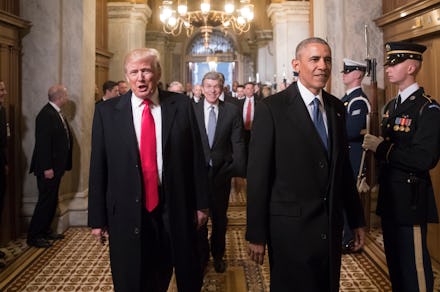Loyalty Day: The difference between Trump's and Obama’s proclamations is stunning

We get it, there are a lot of holidays to keep track of in the United States. We have Arbor Day, Pizza Day, Puppy Day and even an entire National Ice Cream month. So, when President Donald Trump declared May 1 as "Loyalty Day" it's totally understandable that most people had a knee-jerk freak out, thinking this was yet another of his terrifying, dictator-y ideas. But, we can't blame Trump for this one, as Loyalty Day has been around since 1921 and every president since Dwight D. Eisenhower has celebrated it.
Loyalty Day was first observed in response to the First Red Scare and was originally called "Americanization Day," the Los Angeles Times reported, adding that the day became a legally designated holiday in 1958 following an act of Congress. According to the U.S. Code, "Loyalty Day is a special day for the reaffirmation of loyalty to the United States and for the recognition of the heritage of American freedom."
But, what is unique to Trump is the tone he took while declaring National Loyalty Day compared to presidents before him.
Take, for example, the measured words former President Barack Obama used in his 2016 proclamation of Loyalty Day, reading in part:
"Our Nation has always been at its finest when guided by a spirit of shared sacrifice and common purpose. It is that spirit that led a small band of patriots to declare our fledgling democracy free from the grasp of tyranny, that slaves and abolitionists carried in their hearts as they marched forward on the long journey toward freedom, and that guides the men and women who wear our country's uniform in their selfless service. From the unlit paths of the Underground Railroad to the lunch counters of Greensboro, the first streets draped in the colors of pride to the highest Court in our land, we have seen throughout our history that America is inexorably driven forward by those who commit themselves to expanding our founding promise through extraordinary acts of courage and heroism. We honor that legacy — that demonstrates that the forces of hope and love of country are strong enough to overcome even our most deeply entrenched obstacles -- by resolving to carry it forward, by rejecting appeals to prejudice and division in our time, and by drawing on the hopes and dreams that bind us."
In his declaration, Obama evokes the very ideals our nation was founded on and reminded Americans of the great circumstances we have overcome as a nation together. In the entire proclamation, Obama used the word "hope" twice, "love" once and "future" twice.
Now, here's a bit of Trump's Loyalty Day proclamation:
"As one Nation, we will always stand strong against the threats of terrorism and lawlessness. The loyalty of our citizenry sends a clear signal to our allies and enemies that the United States will never yield from our way of life. Through the Department of Defense and other national security agencies, we are working to destroy ISIS, and to secure all Americans the liberty terrorists seek to extinguish. We humbly thank our brave service members and veterans who have worn our Nation's uniform from the American Revolution to the present day. Their unwavering loyalty and fidelity has made the world a safer, more free, and more just place. We are inspired by their pride in our country's principles, their devotion to our freedom, and their solemn pledge to protect and defend our Constitution against all enemies, foreign and domestic."
By contrast, Trump used the word "terror" or "terrorist" three times and "enemies" twice. However, this isn't the first time Trump has taken a decidedly different route with national holiday proclamations.
As Mic reported in January, following his own inauguration, Trump declared the day a National Day of Patriotic Devotion. In his proclamation Trump stated in part, "Freedom is the birthright of all Americans, and to preserve that freedom we must maintain faith in our sacred values and heritage ... There are no greater people than the American citizenry, and as long as we believe in ourselves and our country, there is nothing we cannot accomplish."
By comparison, his predecessor Obama named it National Day of Renewal and Reconciliation, saying in part, "On this Inauguration Day, we are reminded that we are heirs to over two centuries of American democracy, and that this legacy is not simply a birthright — it is a glorious burden. Now it falls to us to come together as a people to carry it forward once more."
Even Trump's national day name, National Day of Patriotic Devotion, signals a change from presidents past. Both President George H.W. Bush and George W. Bush declared their inauguration days a "National Day of Prayer and Thanksgiving," while President Bill Clinton declared his inauguration days "National Day of Fellowship and Hope" and "National Day of Hope and Renewal."